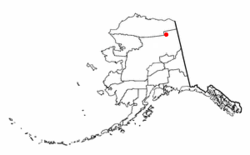Arctic Village, Alaska
|
Arctic Village Vashrąįį K’ǫǫ |
|
|---|---|
| CDP | |

Aerial view of Arctic Village in wintertime.
|
|
 Location of Arctic Village, Alaska |
|
| Coordinates: 68°7′19″N 145°31′40″W / 68.12194°N 145.52778°WCoordinates: 68°7′19″N 145°31′40″W / 68.12194°N 145.52778°W | |
| Country | United States |
| State | Alaska |
| Census Area | Yukon-Koyukuk |
| Government | |
| • State senator | Click Bishop (R) |
| • State rep. | Dave Talerico (R) |
| Area | |
| • Total | 69.8 sq mi (180.9 km2) |
| • Land | 61.7 sq mi (159.8 km2) |
| • Water | 8.1 sq mi (21 km2) |
| Population (2000) | |
| • Total | 152 |
| Time zone | Alaska (AKST) (UTC-9) |
| • Summer (DST) | AKDT (UTC-8) |
| ZIP code | 99722 |
| Area code(s) | 907 |
| FIPS code | 02-03990 |
Arctic Village (Vashrąįį K’ǫǫ in Gwich’in) is an unincorporated Native American village and a census-designated place (CDP) in Yukon-Koyukuk Census Area, Alaska, United States. As of the 2000 census, the population of the CDP was 152. The village is located in the large Gwitch'in speaking region of Alaska, and the local dialect is known as Di'haii Gwitch'in or Kutchin. As of 1999, over 95% of the community speaks and understands the language. (Kraus, 1999)
Evidence from archaeological investigations indicate that the Arctic Village area may have been settled as early as 4500 BC. Around 500 AD the Athabascan speaking Gwich’in people (often called Neets'aii Gwich'in or “those who dwell to the north”) came into the area with seasonal hunting and fishing camps. About 1900, the village became a permanent settlement.
Arctic Village is located at 68°7′19″N 145°31′40″W / 68.12194°N 145.52778°W (68.121828, -145.527686), on the east fork of the Chandalar River, about a hundred miles north of Fort Yukon. The area consists of flat floodlands near the river, but is mostly wooded hills.
Both the CDP and the "village" have the same total area, 69.9 square miles (181 km2), of which, 61.71 square miles (159.8 km2) is land and 8.12 square miles (21.0 km2) (11.63%) is water.
...
Wikipedia
